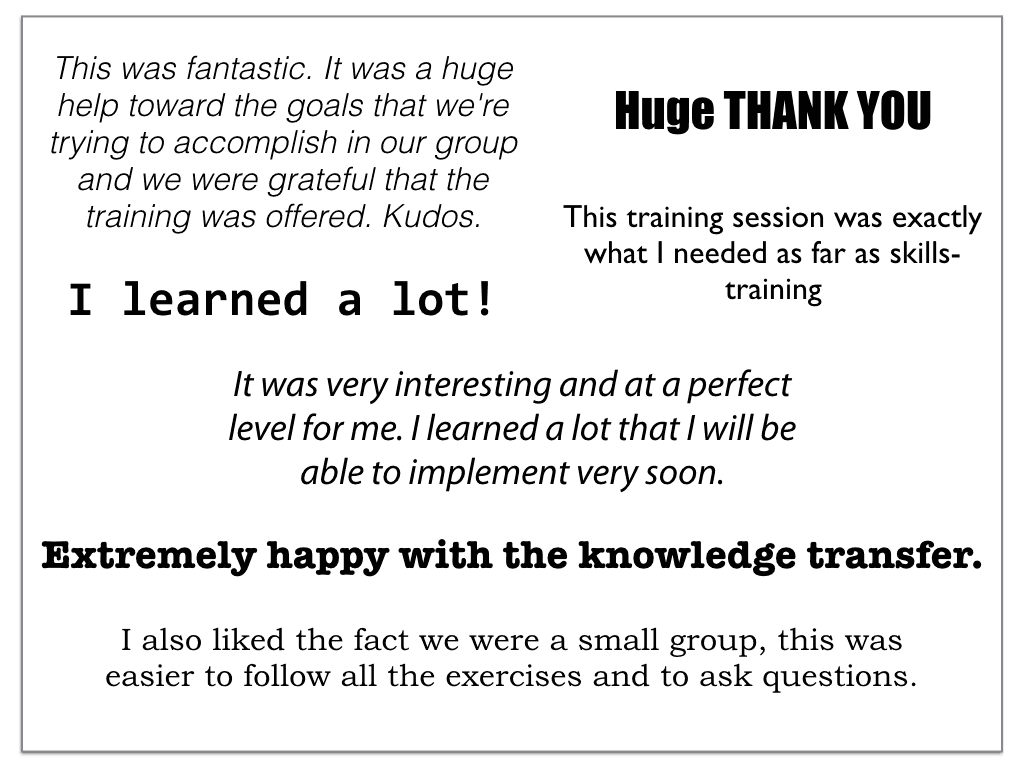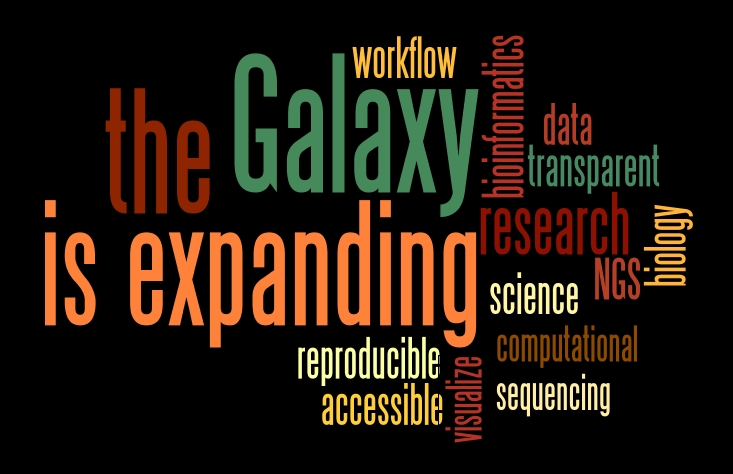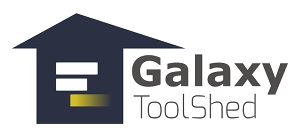January 2019 Galactic News
Events (Admin Training, PAG, GSOC, GCC, GalaxyAdmins), Platforms, Pubs, Jobs, COTM!, Doc, Training, Tools, Releases and more
The January 2019 Galactic News is here! This is a summary of what is going on in the Galaxy community. Here’s what’s happening:
- Event News
- 2019 Galaxy Admin Training: Registration is still open!
- Training topic nomination for GCC2019 Training extended through 15 January!
- Galaxy will be at the 2019 Plant and Animal Genome (PAG) conference
- Galaxy needs your Google Summer of Code Project suggestions
- And GalaxyAdmins needs your topic suggestions
- 80 new publications, including several spectacular ones
- Some most excellent Galaxy Platform News, including the EGI Marketplace.
- The Contributor of the Month is … Simon Gladman!
- 17 Open positions in 6 countries on 3 continents.
- Doc, Hub, and Training Updates covering RNA-Seq visualizations, BlockClust, cloud storage, cancer proteogenomics, and some introductory videos
- ToolShed contributions
- New releases:
- Tripal Galaxy - connect Galaxy to your online database
- BioBlend - a Python API for Galaxy and CloudMan
- Planemo - utilities for building tools for Galaxy
- And a bunch of other news too
If you have anything to add to next month’s newsletter, then please send it to outreach@galaxyproject.org.
Event News

Tired of sitting in the same old time zone ? Here are some upcoming events to help get you out and about.
2019 Galaxy Admin Training
There is still space, but register today as that space is limited and the workshop will likely sell out.
Galaxy Admin Training will be offered January 28 through February 1 at Penn State University, where the Galaxy Project got started over ten years ago. The workshop is split into a 2 day introductory session and a 3 day advanced topics session. Participants can register for one or both sessions. See the Galaxy 2019 Admin Training page for more details.
Still wondering if you should go? Here’s some feedback from the last time this group taught this workshop.
Galaxy @ PAG 2019
Going to Plant and Animal Genome in San Diego this month? Do you have a colleague who will be there? PAG is an ideal venue for learning about Galaxy and how to apply it to complex research analysis problems.
There will be a Galaxy Workshop featuring 6 talks from the community, plus a page full of other talks and posters during the rest of the conference. Some Galaxy highlights from PAG 2019:
- ELIXIR Resources for Interoperability, Frederik Coppens
- Execution of Scientific Workflows for Tripal-Based Community Databases, Shawna Spoor
- Integrated Genomic Selection Galaxy Analysis Pipeline and Workflows, Star Yanxin Gao
- Galaxy Workshop: An Open Platform for Data Analysis and Integration
- Introduction to Galaxy and the Galaxy Ecosystem, Frederik Coppens
- A Phenomenal Workflow to Study the Metabolites Variation in Bryophytes across Seasons, Steffen Neumann
- Galaxy Tools for Comparative Gene Family Analysis in Plant Genomics, Eric Wafula, Claude dePamphilis
- Galaxy Metabolomics from the Ground up, Arthur Eschenlauer
- Multi-Omics with Galaxy for Diverse Biological Applications, Tim Griffin, Pratik Jagtap
- Eukaryotic Genome Annotation with G-OnRamp, Luke Sargent
See the Galaxy @ PAG 2019 page for a complete list.
Galaxy needs your Google Summer of Code Project suggestions
Galaxy will be applying to participate in the 2019 Google Summer of Code. We will again be participating as part of the Open Genome Informatics Group that also includes Bioconda, GMOD, Reactome, MGI, OICR, and WormBase.
We are currently building our group’s proposal. If you have an idea for a project that you would be interested in mentoring someone for, then please add it to the proposal, either directly on this page (requires an account), of via this online form.
The deadline for submitting your project proposals is February 1.
GCC2019 Training Topic Nomination Extended to 15 January
The 2019 Galaxy Community Conference (GCC2019) will be held in Freiburg, Germany, 1-6 July. Like previous Galaxy Community Conferences, GCC2019 will feature invited keynotes, accepted talks, posters, demos, birds-of-a-feather gatherings, and training. The format of GCC2019 will be a bit different than the previous years: it starts with 1 day of training and then 3 days with more specialized training sessions aligned with talks. You can read more about the new format on the conference FAQ.
The training topics that are offered are determined by the community so BY YOU!
Nominated topics can cover a wide range. For example:
- Introduction to Using Galaxy
- Scientific topic oriented trainings
- Community specific trainings
- Development and administration around Galaxy
- Train the trainers
This list only shows some examples. Any topic of interest to the Galaxy Community can be nominated and you are encouraged to nominate more than one topic. If you are looking for ideas, see the topic nominated in: 2016, 2015, 2014, 2013 and the Galaxy Events page.
Training nomination has been extended to 15th January. Topics are being compiled into a uniform list by the GCC2019 Organizing Committee, and topics will be voted on by the Galaxy Community.
Please give some thought to what topics you would like to see offered, or that you would like to offer.
GalaxyAdmins needs your topic suggestions
After a two year hiatus, the bimonthly online GalaxyAdmins meetups will return on February 28. GalaxyAdmins is a discussion group for Galaxy community members who are responsible for Galaxy installations. Our online meetups are around an hour long and feature a presentation followed by an open discussion. It’s a great place to catch up on what your fellow admins are thinking about.
But, before we start meeting next year, we need to know what you care about. What do you want to learn? Who do you want to hear from? What’s causing you trouble? Or, what have you worked that your fellow GalaxyAdmins would benefit from knowing?
Got some ideas? Nominate them
Upcoming events
These and other Galaxy related events are coming up in the next few months:
Publications
80 new publications referencing, using, extending, and implementing Galaxy were added to the Galaxy Publication Library in December.
Highlighted Publications
Galactic and Stellar publications from December:
- Galaxy-Kubernetes integration: scaling bioinformatics workflows in the cloud, Pablo Moreno, Luca Pireddu, Pierrick Roger, Nuwan Goonasekera, Enis Afgan, Marius van den Beek, Sijin He, Anders Larsson, Christoph Ruttkies, Daniel Schober, David Johnson, Philippe Rocca-Serra, Ralf J.M. Weber, Bjoern Gruening, Reza Salek, Namrata Kale, Yasset Perez-Riverol, Irene Papatheodorou, Ola Spjuth, Steffen Neumann, bioRxiv 488643; doi: 10.1101/488643
- PhenoMeNal: Processing and analysis of Metabolomics data in the Cloud, Kristian Peters, James Bradbury, Sven Bergmann, Marco Capuccini, Marta Cascante, Pedro de Atauri, Timothy M D Ebbels, Carles Foguet, Robert Glen, Alejandra Gonzalez-Beltran, Ulrich L Günther, Evangelos Handakas, Thomas Hankemeier, Kenneth Haug, Stephanie Herman, Petr Holub, Massimiliano Izzo, Daniel Jacob, David Johnson, Fabien Jourdan, Namrata Kale, Ibrahim Karaman, Bita Khalili, Payam Emami Khonsari, Kim Kultima, Samuel Lampa, Anders Larsson, Christian Ludwig, Pablo Moreno, Steffen Neumann, Jon Ander Novella, Claire O’Donovan, Jake T M Pearce, Alina Peluso, Marco Enrico Piras, Luca Pireddu, Michelle A C Reed, Philippe Rocca-Serra, Pierrick Roger, Antonio Rosato, Rico Rueedi, Christoph Ruttkies, Noureddin Sadawi, Reza M Salek, Susanna-Assunta Sansone, Vitaly Selivanov, Ola Spjuth, Daniel Schober, Etienne A Thévenot, Mattia Tomasoni, Merlijn van Rijswijk, Michael van Vliet, Mark R Viant, Ralf J M Weber, Gianluigi Zanetti, Christoph Steinbeck, GigaScience, giy149, doi: 10.1093/gigascience/giy149
- Cloud Bursting Galaxy: Federated Identity and Access Management, Vahid Jalili, Enis Afgan, James Taylor, Jeremy Goecks, bioRxiv 506238, doi: 10.1101/506238
- SkeletalVis: an exploration and meta-analysis data portal of cross-species skeletal transcriptomics data, Jamie Soul, Tim E Hardingham, Ray P Boot-Handford, Jean-Marc Schwartz, Bioinformatics, bty947, doi: 10.1093/bioinformatics/bty947
All of the highlighted papers are open access.
Publication Topics
| # | Tag | # | Tag | # | Tag | # | Tag | |||
|---|---|---|---|---|---|---|---|---|---|---|
| 56 | +Methods | 23 | +UsePublic | 11 | +UseMain | 9 | +RefPublic | |||
| 8 | +Workbench | 7 | +UseLocal | 6 | +Reproducibility | 3 | +IsGalaxy | |||
| 2 | +Cloud | 2 | +Shared | 2 | +Tools | 2 | +Unknown | |||
| 1 | +Project |
Galaxy Platforms News
The Galaxy Platform Directory lists resources for easily running your analysis on Galaxy, including publicly available servers, cloud services, and containers and VM that run Galaxy. Here’s what’s new.
EGI Marketplace

EGI is a federation of hundreds of data and compute centres worldwide and tens of cloud providers united by a mission to support research activities. Galaxy instances are available to users worldwide under the EGI Marketplace’s Applications on Demand BETA program. You need to create an account and then apply for an allocation.
If you are an academic researcher, want a Galaxy instance running on a research cloud, and you don’t live in a country where you already have ready access to Galaxy on a cloud (see the Academic Cloud tab in the Platforms Directory), then take a look at the EGI Marketplace.
ChemFlow
The ChemFlow public Galaxy server supports Chemometrics and infrared spectrometry data analysis. ChemFlow has a detailed tutorial (although it’s in French), and an onlinie support form. ChemFlow is supported by the ChemProject, a consortium of French research organizations.
Chemometrics is a collection of tools for extracting information from spectral data. The methods are essentially linear, with regressions, discriminant analyzes, unsupervised classifications, spectral decompositions, multi-array-multipath methods, plus pretreatments. Many applications focus on the near infrared. Its complementarity with the Chemoocs mooc on France Digital University guarantees the correct use of chemometrics tools.
ChIP-Seq Docker
This isn’t new in the world, but it is new in the Galaxy Platform Directory: A Galaxy Docker instance for ChIP-Seq analysis.
Other Platform News
Galaxy-P
The Galaxy-P team has compiled all their talks, workshops, and posters from 2018 (and there were a lot of them) in this handy list. Tim Griffin and Pratik Jagtap will also be presenting at PAG this month.
usegalaxy.org.au
The Australian Environmental Microbiome Research Data Cloud Project is now complete and is live on the Bioplatforms Australia Data Portal and Galaxy Australia.
Galaxy Platforms in Publications
We tag papers that use, mention, implement or extend public Galaxy platforms (servers, services, clouds, containers…). Here are the counts for the past month’s publications:
New Galactic Blog Posts
There is one new Galactic Blog entry:
- Contributor of the Month: Simon Gladman:
- ‘firefighter, cheesemaker, pillar of the Galaxy Australia, and an overall jolly good fellow’
- by Martin Čech
Who’s Hiring

The dark energy* of irreproducible research is threatening the science universe! Please help the Galaxy expand!
- Bioinformatics Scientist, Providence Health Services, Portland, Oregon, United States. Looking for someone “fluent in Galaxy or willing to learn”
- Etude et galaxyfication d’un pipeline de traitement de données en lipidomique, Centre INRA Auvergne-Rhône-Alpes, Theix, France
- assemblage et annotation des génomes, Faculté des Sciences et Techniques, Tours, France
- Chief Scientific Officer University of Cape Town, South Africa. Develop a comprehensive database, informatics tools and toolsets on a Galaxy/web bioinformatics server.
- M2 - bio-informatique, Laboratoire de Virologie , Hôpital St Louis, Paris, France.
- Cloud Computing Bioinformatics Programmer working with IRIDA, Simon Fraser University, Vancouver, Canada
- M2 - Epigénétique : effet de la température sur le méthylome lors de la masculinisation du tilapia du Nil, UMR 116 ISEM au Cirad, Campus International de Baillarguet, Montpellier, France
- Senior IT DevOps Data Engineer and Senior IT Data Engineer (IT Bioinformatician), Adaptimmune, Abingdon, Oxfordshire, United Kingdom. Required: Experience with following bioinformatic pipeline tools: Galaxy…
- Specialist Solutions Architect — Biological Sciences, Amazon Web Services, United States
- Principal Technical Business Development Manager: AWS Research in Biomedical, Amazon Web Services, United States
- 2-year IR/postdoc position (Analysis of Genomic Variants in Children and Young Adults with Acute Myeloid Leukemia), Analyse Bioinformatique ARTbio, Paris, France
- Bioinformatics Scientist, ResearchDx, Irvine, California, United States
- NGS Scientific Applications Specialist, Integrated DNA technologies, Iowa City, Iowa, United States
- Freiburg Galaxy Team has open positions, Freiburg, Germany
- The Blankenberg Lab in the Genomic Medicine Institute at the Cleveland Clinic Lerner Research Institute is hiring postdocs.
- Galaxy Project is hiring two software engineers at Johns Hopkins University, Baltimore, Maryland, United States).
Have a Galaxy-related opening? Send it to outreach@galaxyproject.org and we’ll put it in the Galaxy News feed and include it in next month’s update.
Doc, Hub, and Training Updates
Here some significant activity from the Galaxy Training Materials in December, and the Hub as well:
GTN Training Materials
- New Visualization of RNA-Seq results with Volcano Plot tutorial, by Maria Doyle
- New Visualization of RNA-Seq results with heatmap2 tutorial, Maria Doyle
- New Small Non-coding RNA Clustering using BlockClust tutorial, by Pavankumar Videm
Hub
- Cloud Storage API, by Vahid Jalili
- Securely Authorize Galaxy to Access Protected Data on Cloud, by Vahid Jalili
Other Training Materials and Doc
- Tackling Analytical challenges in Cancer proteogenomics using Galaxy framework tutorial and slides, presented by Pratik Jagtap of the Galaxy-P team, at the Cancer Proteogenomics Workshop, in Pune, India
- Genomics: gentle introduction to genomic data analysis with Galaxy, a set of videos by Joe Wu at the University of Florida
ToolShed Contributions
 ](http://toolshed.g2.bx.psu.edu/)
](http://toolshed.g2.bx.psu.edu/)Tool Shed contributions in December 2018.
Releases
New additions to the Galaxy Ecosystem.
Tripal Galaxy Module 1.0
Tripal Galaxy is a Drupal module is designed to support integration of the Tripal online database construction toolkit with Galaxy. It uses the blend4php library. In the past, community databases have often provided analytical tools that come prepared with site-specific data. Examples include BLAST, CAP3, and InterProScan servers, for example. By integrating Tripal with Galaxy, the Tripal-based community database can offer more complicated analytical tools that support larger data sets using Galaxy as a backend.
The Tripal Galaxy module provides more than just a “wrapper” for Galaxy. Site administrators can provide files to help end-users easily integrate data from the site within workflows. On Tripal v3 sites, user’s can create data collection containing data gleaned from the site which in turn can be used in Galaxy workflows. Quotas are provided to prevent users from overunning the storage space of the server and usage statistics help a site admin learn which workflows are most used and who are the biggest users.
BioBlend 0.12.0
BioBlend is a Python library for interacting with CloudMan and Galaxy‘s API. BioBlend makes it possible to script and automate the process of cloud infrastructure provisioning and scaling via CloudMan, and running of analyses via Galaxy.
See the release notes for what’s new in release 0.12.0.
Planemo 0.58.0
Planemo is a set of command-line utilities to assist in building tools for the Galaxy project. These releases included numerous fixes and enhancements.
See GitHub for details.
Other News
- From Anup Kumar on Twitter
- From PLOS Computational Biology on Twitter:
- Our #mostcited #10SimpleRules article ‘Ten Simple Rules for Reproducible Computational Research’ has been cited 171 times https://plos.io/2QJI7sk #1000SimpleRules
- From RC Carter:
- There’s progress being made with Galaxy deployments on Microsoft Azure Stay tuned.
- The times when you couldn’t use emoji to tag Galaxy datasets are past. Behold!
Galaxy Help: The new Q&A site for Galaxy
Visit the new Galaxy Community Q&A web site. Galaxy Help joins the Galaxy Matrix channels, Galaxy mailing lists and the Galaxy Hub as another place to get answers to your Galaxy related questions.
Galaxy Help replaces Galaxy BioStars, which is being retired after almost 5 years of service. (Galaxy BioStars was itself a replacement for the earlier galaxy-user mailing list.) The Galaxy BioStars site will remain up as a read-only archive (and will still be searched by the Galaxy Hub search).
Here are some exemplary recent threads in Galaxy Help
- How to Add gene information (gene name, strand etc.,) to the DESEQ2 output file generated by Galaxy, by James PC and Pavankumar Videm
- Regarding Understanding Quality of Mutation, by Debanjan Roy and Wolfgang Maier
- multithreading and parallel processing files, by Hiba Shaban, James Taylor, and Enis Afgan
GCCBOSC 2018 Videos are now available
Videos from GCCBOSC 2018 are available online and are linked to from the conference web site. Talks from the GCC parts of the meeting are available on a Galaxy Vimeo channel, and talks from the BOSC parts are available on a BOSC YouTube channel (and joint keynotes are available on both). There are over 70 presentations across both channels, showing every talk from the opening keynote to the closing keynote.
European Galaxy Days: Slides are online
Slides for presentations at European Galaxy Days are now online. EGD2018 featured almost 20 talks spanning the Galactic specturm, from implementation to application. Take a look.













